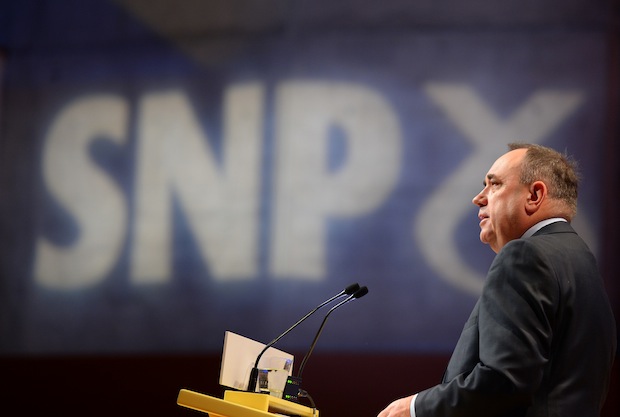Somehow I managed to miss Iain Martin’s praise for the manner in which David Cameron has “handled” the referendum on Scottish independence. Happily, John Rentoul has prompted me to take a keek at Iain’s article which, somewhat uncharacteristically, concludes that the Prime Minister has “played a blinder”.
This, as Mr Rentoul cautions, is premature praise. We are asked to believe that Cameron has pursued a policy of masterly inactivity. It is also suggested that securing a single-question referendum was a masterstroke rather than, well, the obvious outcome of a negotiating process between Edinburgh and London that was much less dramatic, and much less important, than everyone agreed at the time to pretend it was.
Of course, many pundits have sometimes suggested that Alex Salmond has been forced – by his own startling electoral success – to hold a referendum that, actually, he’d have been quite happy to avoid. I dare say I’ve made that suggestion too. I’ve certainly thought it. The SNP’s victory in 2011 surprised the SNP themselves.
But it is, in the end, the kind of analysis that risks being too clever-by-half. It turns out that Alex Salmond is quite relaxed about having a referendum. So are his parliamentary colleagues. The reason for this is quite simple: they think they can win. (And a single question referendum is the only kind the nationalists can win.)
It is true that the opinion polls offer little encouragement to this view. But it is also true that almost no-one thinks the final result will be very much like the current opinion polls. The referendum is not being held tomorrow.
It may be – nay is! – in everyone’s interests to caution that the referendum will be much closer than the polls presently suggest. That does not alter the likelihood that it actually will be rather close. Few people expect the Unionists to win 65-35 and not many think it will be 60-40 either. At which point, the swing required for a Yes vote becomes something achievable.
The No campaign has two particular enemies: the nationalists and complacency. The latter is almost as formidable a foe as the former. Moreover, the Yes campaign enjoys an advantage in enthusiasm. That helps. So does the fact that it builds on the SNP’s own election campaign machine which, by common agreement, is the most formidable such apparatus in Scotland.
The Scottish government’s White Paper on independence will be published later this month. It cannot answer all questions and Unionists, not altogether unreasonably, will continue to demand more detailed responses to their questions (not all of which are nit-picking).
Of course, the White Paper is not the last word on anything. It can only sketch one possible future. The detail of independence will still be a matter to be decided in future negotiations, the outcome of which is necessarily uncertain and, indeed, unknowable.
Nevertheless, as I say, we should expect the White Paper to be at least a plausibly plausible version of one possible future. It should give the Yes campaign a boost (if it doesn’t then something will have gone wrong).
Meanwhile, it is no secret that the No campaign worries about the Labour vote. I don’t suppose many people outside Glasgow could tell you very much about Sir Charles Gray. Nevertheless, the fact that the former Labour leader of Strathclyde Regional Council intends to vote Yes is a reminder that the Labour vote is not as solidly Unionist as No campaigners hope or, perhaps, even need it to be.
Just a straw in the wind? Perhaps. But it is not difficult to find other such straws; not difficult to find people at least open to the idea of independence. It is rather harder to discover people moving from Yes to Undecided to No.
That’s one reason why some smart nationalists are convinced the Unionist vote is soft. The referendum really is “there to be won” as one former nationalist parliamentarian not usually given to wishful thinking told me recently. Perhaps his certainty is ill-placed but it was striking nonetheless. Striking and worth taking seriously.
The polls, of course, still insist upon a different story. And polls are often more reliable than hunches. Nevertheless, hunches nag and nibble away at past certainties. And my hunch, right now, is that the game is far from over. It’s still the first-half.
Indeed, the middle third of the electorate remains undecided and there are many folk who have barely begun to think about the referendum.
In any case, there is something to be said for the idea that Alex Salmond has already won. All the opposition parties have committed themselves to looking at the case for the devolution of more responsibilities to Scotland even if voters reject independence. This includes David Cameron. Salmond didn’t need a second question on the ballot paper to get, implicitly, a commitment to legislate for further devolution.
Perhaps I spend too much time talking to or reading Yes voters. I’m hesitant to proclaim the battle won already and not just because, frankly, the independence referendum is good for freelance journalists whose own interests lie in it being a dead heat requiring a replay in 2017.
Be that as it may, something is afoot. If neither campaign has yet distinguished itself I still think the Yes campaign’s story is the easier one to tell. For that matter, I think it still has plenty of ammunition stockpiled for use next year. There are still new things for it to say. One danger for Unionists is that they may not be able to say the same. They have a more limited repertoire and we may have heard it all already. Several times in fact.
I don’t know. But I do know that people in London seem rather more certain of the outcome than people in Edinburgh. Perhaps distance brings clarity but I can’t help but think the picture more cloudy, complicated and uncertain than some people are suggesting.







Comments